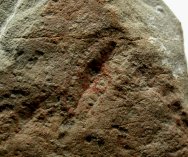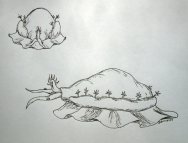Kimberella
quadrata
Phylum Mollusca
(?)
Geological
Time: Precambrian, Vendian (600 - 550 Million Years Old)
Size: 18
mm by 7 mm
Fossil
Site: White Sea Summer Coast, Archangelsk, Russia
 Description:
This spectacular specimen of early life predates the Cambrian Explosion
by tens of millions of years. Many early attempts at diversity were
present during this time, both here and in the Ediacara Fauna of
the Flinders Ranges of Australia. Many strange forms were present,
some of which still do not have any parallels in modern times. This
one is known as Description:
This spectacular specimen of early life predates the Cambrian Explosion
by tens of millions of years. Many early attempts at diversity were
present during this time, both here and in the Ediacara Fauna of
the Flinders Ranges of Australia. Many strange forms were present,
some of which still do not have any parallels in modern times. This
one is known as  Kimberella,
thought by some to have had a tough shell much like modern-day molluscs.
It has been found associated with Radulichnus which appears to show
scrapings much like those made by the radula of a modern snail,
as well as traces that may have been made as Kimberella moved along
the seafloor. Whatever its true identity, it has been assigned to
the Vendozoa, a group of animals that existed prior to the better-known
Cambrian Explosion. The incredible soft-bodied preservation is believed
to be the result of impressions made in a microbial mat contained
within the sand. Kimberella fossils are also found in the Ediacara
Hills of Australia Kimberella,
thought by some to have had a tough shell much like modern-day molluscs.
It has been found associated with Radulichnus which appears to show
scrapings much like those made by the radula of a modern snail,
as well as traces that may have been made as Kimberella moved along
the seafloor. Whatever its true identity, it has been assigned to
the Vendozoa, a group of animals that existed prior to the better-known
Cambrian Explosion. The incredible soft-bodied preservation is believed
to be the result of impressions made in a microbial mat contained
within the sand. Kimberella fossils are also found in the Ediacara
Hills of Australia
|
|